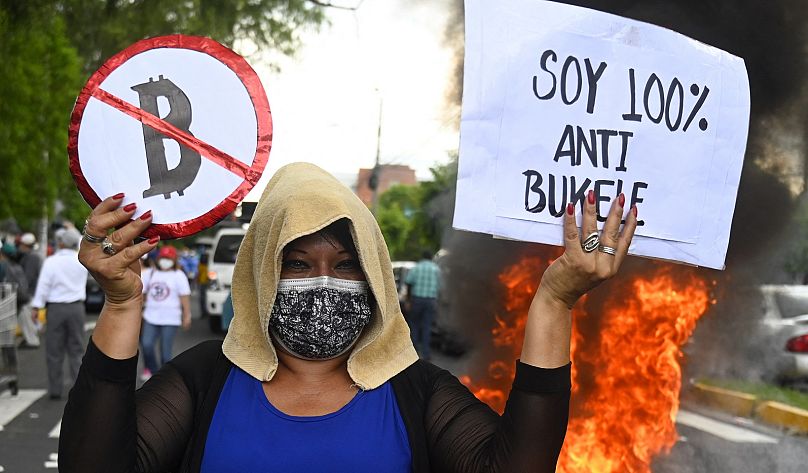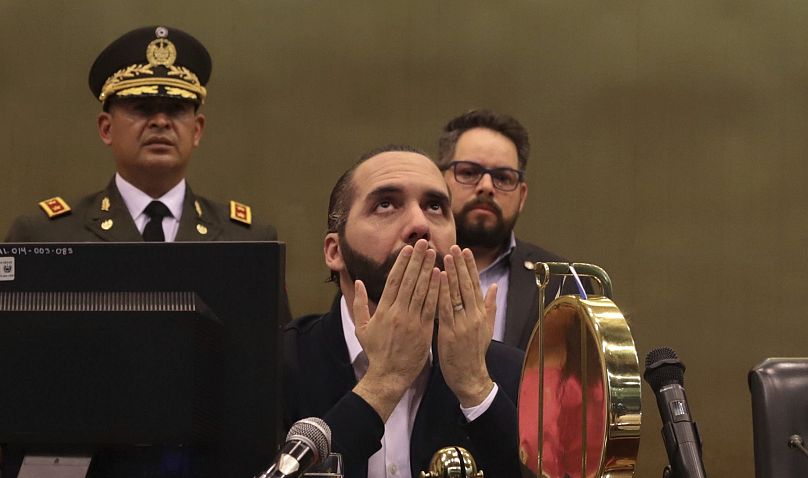Skepticism around Bitcoin was not dispelled when Salvadorans couldn't access the country's new digital wallet - or when its price slid.
Bitcoin's price continued to plunge on Wednesday - a day after its heaviest losses in the two and a half months since El Salvador voted to adopt the crypto asset as legal tender - causing angry protests and havoc online.
At one point on Tuesday, the digital currency fell as much as 18.6 per cent, wiping out more than $180 billion (€152 billion) from the market.
The coin last traded at $46,560 (€39,361), having endured a rocky day's trading on Tuesday which saw it hit a near four-month high of $52,956 (€44,769) before then plunging 11.1 per cent, its largest fall since June 2.
In a historic move, El Salvador became the first country on Tuesday to officially adopt the cryptocurrency as legal tender but it got off to a bumpy start.
Technological glitches hampered its use while street protests by mistrustful citizens broke out in the Central American country.
Proponents say the move will lower commission costs for billions of dollars sent from abroad but which critics warned may fuel money laundering.
The change means businesses should accept payment in Bitcoin alongside the US dollar, which has been El Salvador's official currency since 2001 and will remain legal tender.
President Nayib Bukele, who has pushed for adopting the cryptocurrency, says it will help Salvadorans save about $400 million (€338 million) the government calculates is spent annually on commissions for remittances while giving access to financial services to the unbanked.
Ahead of the launch, El Salvador bought 400 Bitcoins, Bukele said, helping drive the currency price above $52,000 (€ 44,000) for the first time since May.
But underscoring the risks, hours later on Tuesday Bitcoin weakened.
In response, Bukele confirmed in a tweet that El Salvador had bought 150 more Bitcoin in "the dip" so as to benefit more when the price rose again.
Public skeptical of Bitcoin
Doubters say Bitcoin could increase regulatory and financial risks for the Central American nation, and polls show Salvadorans are wary of the volatility of the cryptocurrency, which can shed hundreds of dollars in value in a day.
To warm up a skeptical public, Bukele has promised every citizen $30 (€25) in Bitcoin if they sign up for a government digital wallet.
In the early hours of Tuesday, El Salvador's national digital wallet, Chivo, had not appeared on Apple Inc, Google and Huawei's app download platforms, however, prompting a series of tweets from Bukele, including one with a red-faced "angry" emoticon.
"Release him! @Apple @Google and @Huawei," Bukele said. The wallet was later available from Huawei.
Some citizens were optimistic.
"It's going to be beneficial ... we have family in the United States and they can send money at no cost, whereas banks charge," said Reina Isabel Aguilar, a store owner in El Zonte Beach, some 49 km southwest of capital San Salvador.
Known as Bitcoin Beach, the town of El Zonte aims to become one of the world's first bitcoin economies. However, uptake may be slowed by low internet penetration across the country. It remains unclear whether businesses will be sanctioned if they do not adopt the new currency.
In the run-up to the launch, the government installed ATMs that will allow bitcoin to be converted into dollars and withdrawn without commission from the Chivo digital wallet.
Bukele on Monday asked for patience.
"Like all innovations, El Salvador's Bitcoin process has a learning curve," he said on Twitter. "Not everything will be achieved in a day, or in a month."
Bukele has taken over the levers of power
In barely two years in office, Bukele has taken control of almost all levers of power. Last week, top judges appointed by his lawmakers ruled he could serve a second term.
The 40-year-old president is popular with the public but has been accused of eroding democracy, including by the administration of US President Joe Biden.
Bukele has promised to clean up graft, but the US recently put some of his close allies on a corruption blacklist.
Analysts fear adopting the cryptocurrency could fuel money laundering.
After the bitcoin law was approved, rating agency Moody's downgraded El Salvador's creditworthiness, while the country's dollar-denominated bonds have also come under pressure.
The move has muddied the outlook for El Salvador's quest for more than $1 billion (€843.8 million) in financing from the International Monetary Fund (IMF).
But Bukele, who does not shy away from controversy, on Monday retweeted a video that showed his face superimposed on actor Jaime Foxx's in a scene from Django Unchained, a Quentin Tarantino film about American slavery. The video portrayed Bukele whipping a slave trader who had the IMF emblem emblazoned on his face.
Bukele later deleted the retweet.
In his own tweet, Bukele said: "We must break the paradigms of the past. El Salvador has the right to advance towards the first world".













